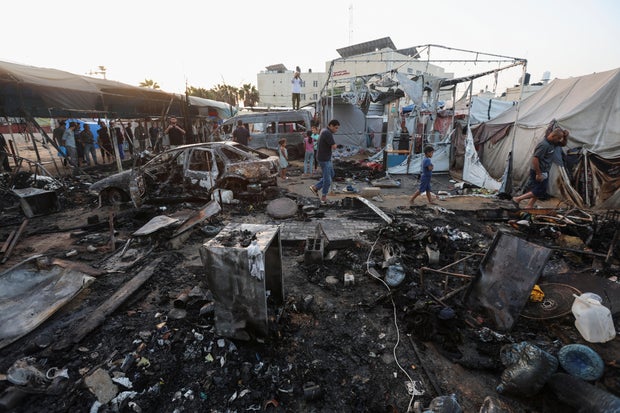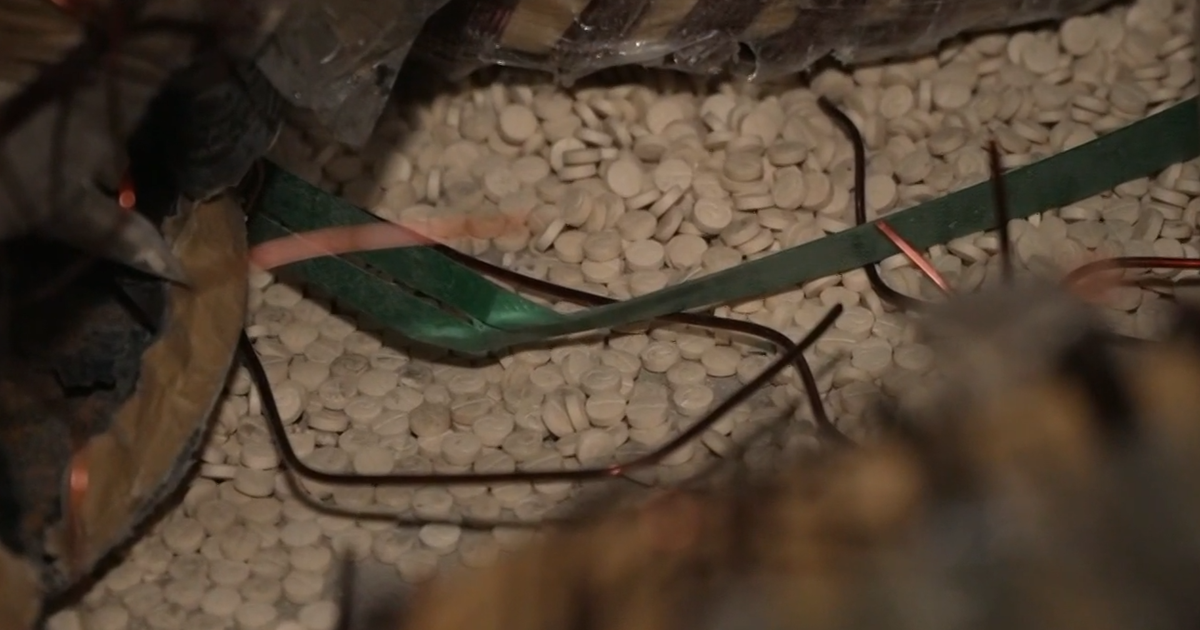CBS News
U.S. raises concern with Israel as Gaza hospital strike appears to leave “displaced civilians burning alive”

At least 15 Palestinians were killed in overnight Israeli airstrikes in the Gaza Strip, the enclave’s Hamas-run health ministry said, as the Israeli military continued its fight against the Iranian-backed group there, and against Hezbollah in Lebanon, with no end in sight on either front.
The White House criticized one of the Israeli strikes carried out in Gaza on Monday after videos posted online appeared to show at least one person on the ground shaking as they were engulfed in flames.
The strike hit the grounds of the Al-Aqsa Martyrs Hospital in Deir al-Balah, in central Gaza, where many displaced Palestinians have taken shelter in a makeshift tent camp. The Hamas-run health ministry said four people were killed.
Ramadan Abed/REUTERS
“The images and video of what appear to be displaced civilians burning alive following an Israeli air strike are deeply disturbing and we have made our concerns clear to the Israeli government,” a spokesperson for the U.S. National Security Council told CBS News in a statement Monday night. “Israel has a responsibility to do more to avoid civilian casualties — and what happened here is horrifying, even if Hamas was operating near the hospital in an attempt to use civilians as human shields.”
Israel says tents at Al-Aqsa hospital hit in “precise strike on terrorists”
A statement by IDF international spokesperson Lt. Col. Nadav Shoshani called it an intelligence-based “precise strike on terrorists who were operating inside a command and control center in the area of a parking lot adjacent” to the hospital.
“Shortly after the strike, a fire ignited in the hospital’s parking lot, most likely due to secondary explosions,” said Shoshani. Israel regularly attributes fires and secondary explosions after its airstrikes to weapons allegedly hidden by Hamas militants. The military has long accused the militants of keeping both weapons and fighters in or underneath civilian infrastructure, using non-combatants as human shields.
Shoshani added that the incident was under review, and said “the hospital and its functionality were not affected” by the strike.
He also reiterated the IDF’s insistence that it takes “numerous steps to mitigate the risk of harming civilians, including the use of precise munitions, aerial surveillance, and additional intelligence.”
2 Democratic lawmakers condemn Israel, and Biden, after Gaza strike
At least two Democratic members of the U.S. Congress issued much more pointed statements than the White House, condemning Israel’s actions in Gaza.
“There are no words powerful enough to capture the agony of human beings being massacred & burned alive,” Missouri Congresswoman Cori Bush said in a statement posted on social media, calling for a complete halt to U.S. weapons sales to Israel. “The U.S. is funding & arming the Israeli military’s extermination of the Palestinian people. It’s unconscionable. End this genocide.”
New York Rep. Alexandria Ocasio-Cortez said in her own social media post that the “horrors unfolding in northern Gaza are the result of a completely unrestrained Netanyahu gov, fully armed by the Biden admin while food aid is blocked and patients are bombed in hospitals. This is a genocide of Palestinians. The US must stop enabling it. Arms embargo now.”
Israel says it listens to U.S., but “national interests” will dictate Iran strike
In addition to the pressure on Israel to limit civilian casualties in Gaza, the White House has also been pushing Prime Minister Benjamin Netanyahu’s government to limit the extent of its expected counterattack on Iran, following the Islamic republic’s massive Oct. 1 missile assault on Israel.
The vast majority of the roughly 180 missiles launched by Iran, in response to Israel’s assassination of several senior Iranian and allied military commanders, were intercepted and nobody was killed in the strike, but Netanyahu vowed just hours after the attack that Tehran would “pay for it.”
There has been significant concern since that threat that Israel could retaliate by striking Iran’s oil infrastructure or its nuclear facilities — something President Biden has said clearly that he would not support. The fear is that such an attack could quickly escalate Israel’s multi-front war with Iran’s so-called proxy groups Hamas and Hezbollah, as well as the Houthis in Yemen, into a full-scale regional war that draws in the United States as Israel’s chief ally.
An official in Netanyahu’s office, replying Tuesday to a Washington Post report that his country’s looming counterstrike would not include targeting Iranian nuclear or oil facilities, but rather military sites, told CBS News that the Israeli government does “listen to the opinions of the United States, but we will make our final decisions based on our national interests.”
Netanyahu’s security cabinet has agreed on which targets to strike in Iran, when to hit them and how hard, according to Israeli media reports, which said a final vote of approval by the cabinet was still pending Tuesday. It was unclear when that final vote might be held, and there was no confirmed information on the suggested timetable or details of the pending retaliatory action.
On Monday, Netanyahu visited soldiers wounded over the weekend in a rare deadly Hezbollah drone strike on the Golani military base in central Israel. The IDF, in a preliminary investigation of that attack, admitted a failure of intelligence had led the military to believe the drone had been shot down. Instead, it flew for half an hour from Lebanon to reach its target, killing four Israeli soldiers and wounding dozens of other people.
He stressed that Israel would continue hitting Hezbollah in Lebanon “without mercy,” including with further strikes on the country’s capital Beirut.
Netanyahu and the IDF have said the goal of the operations in Lebanon is to enable the return of some 70,000 Israelis displaced from their homes in northern Israel, near the Lebanese border. They were forced to flee when Hezbollah started launching drones and missiles at Israel on Oct. 8, 2023 in support of Hamas — the day after the smaller group launched its terrorist attack on Israel from Gaza, sparking the ongoing war there.
The cross-border fire between Israel and Hezbollah has also forced an exodus from southern Lebanon. The United Nations said Tuesday that more than 400,000 children were among those to have fled from their homes in southern Lebanon over the last several weeks alone, since the IDF ramped up its assault on Hezbollah.
CBS News
Video shows freight train derailing after crashing into tractor-trailer in Texas

Watch CBS News
Be the first to know
Get browser notifications for breaking news, live events, and exclusive reporting.
CBS News
CEO shooting suspect Luigi Mangione arrives in New York after waiving extradition in Pennsylvania

Watch CBS News
Be the first to know
Get browser notifications for breaking news, live events, and exclusive reporting.
CBS News
“Sleepmaxxing” trend has young adults optimizing their sleep. Experts share some do’s and don’ts.

How to get an ideal night of sleep has been trending on social media. It’s called sleep optimization, or “sleepmaxxing,” and it’s particularly popular among younger Americans.
From using sleep trackers to sleeping with mouth tape, social media users are sharing tips online for what they do to catch more Z’s — and millions of people are paying attention.
Kamila Charles, a college senior in Florida, is among the many young adults who are now prioritizing their sleep routine.
“Magnesium, I do my skin care, I put my hair in rollers,” she said of her nightly rituals. “I’m trying to figure out what works for me because it is hard.”
Another student, Craig James, told CBS News he makes sure his room is dark, quiet and cold for optimal sleep. “No television on, no nothing,” he said. Many sleep experts echo that advice.
One recent analysis found members of Gen-Z spend more time sleeping than any other generation. That same survey showed they also spent more time exercising and prioritizing self-care than others.
“They just want to make the quality better, which is a good thing,” Dr. Rafael Pelayo, a clinical professor at Stanford University’s Sleep Medicine division, told CBS News. “Even though they may be considered good sleepers overall, they want to make their sleep even better.”
A recent Gallup survey found a majority of Americans — 57% — said they would feel better if they got more sleep.
The American Academy of Sleep Medicine recommends 7 to 8 hours of sleep per night, though it depends on age and other factors.
Middle schoolers should get about 9 to 12 hours a night, high schoolers about 8 to 10 hours, and adults more than 7 hours, Dr. Nidhi Kumar recently told CBS News New York.
“How many high schoolers are really sleeping that much?” Kumar said. “We are a country that is chronically sleep deprived.”
Sleep scientist Vanessa Hill recently told CBS News the sleepmaxxing trend may be beneficial because it gets people thinking about their sleep.
“So I think overall, it’s good,” she said, but warned, “sometimes when people can be too perfectionistic about their sleep, it can backfire.”
Risks of the sleepmaxxing trend
Despite the wellness intentions, experts say some aspects of this trend could do more harm than good.
“A lot of the things people do are not necessarily evidence-based,” Pelayo said. He also warns against obsessing over smartphone sleep trackers.
Kumar agrees, saying the problem with tracking your sleep is it can become obsessive.
“People can actually start dealing with an anxiety about trying to get to sleep,” she said.
She also says people should avoid mouth taping, a practice many have seen on social media.
“I’m going to say a hard no to mouth taping. It can actually be quite dangerous. It can increase snoring. It can cause anxiety, suffocation. It can cause a reduction in oxygen levels in certain susceptible individuals,” she said.
Kumar advises against the many pills and potions being promoted online, but says two supplements can be useful.
“Certain forms of magnesium, magnesium threonate, crosses the blood brain barrier (and) can help with sleep,” she said. “And if you’re dealing with jet lag, melatonin can be helpful. Other than these two supplements, nothing else has really been shown to work.”
Benefits of better sleep
Sleepmaxxing is helping to repopularize certain aspects of good sleep hygiene that everyone should try to embrace, Hill said.
“Things like try not to use your devices for half an hour or so before bed. Try to stick to a consistent bedtime. Try to have a relaxing wind-down routine. All of these things can set us up for a good night’s sleep,” she said.
Improving sleep is a positive step for overall health.
Kumar said quality sleep can lead to fewer sick days because it boosts your immune system. It can also help you maintain better weight control and reduce your risk of other serious conditions.
“Lower rates of heart attack, stroke, diabetes and high blood pressure; better mood, better attention, less stress, less anxiety,” she said.
If you are having trouble with your sleep, it’s best to consult your doctor.
“TikTok is not the answer when you really do have a problem, and there are a lot of sleep problems out there,” Hill said.









